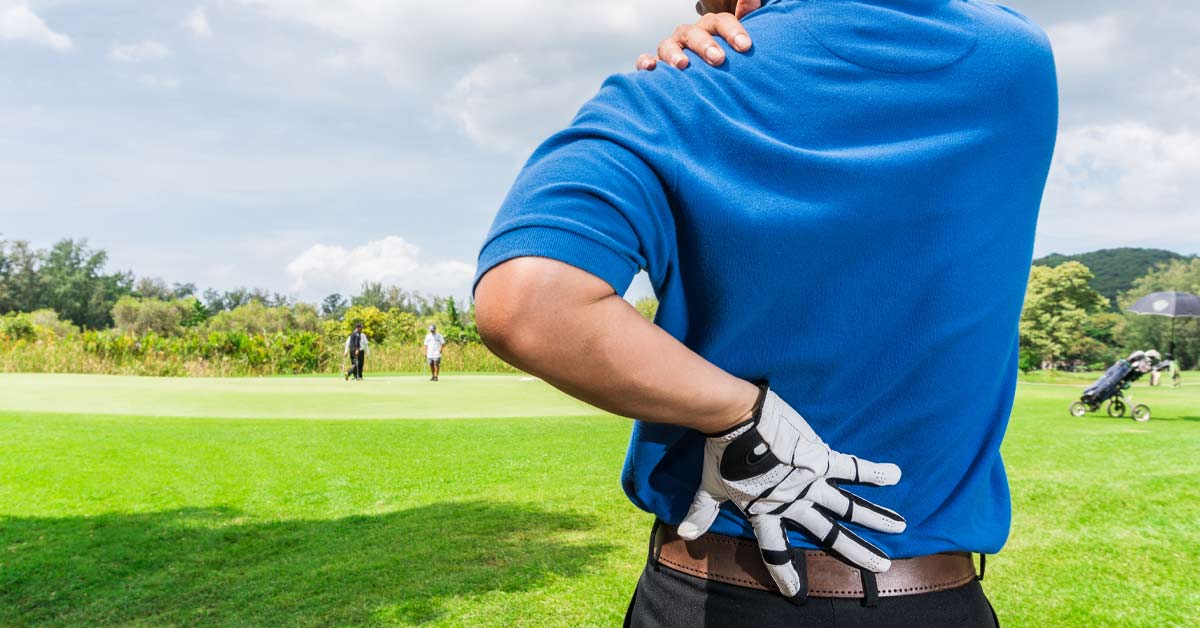Sports Injuries and Back Pain: What You Should Know

When athletes suffer back injuries, it doesn’t only slow down their game. It can slow them down off the field as well. When you have sports injuries and back pain, even the slightest movement can be agonizing.
Back pain is a common complaint for athletes – especially those who play high-impact sports. Not surprisingly, about 50% of football linemen complain of back pain.
Sports that require twisting movements also commonly suffer from back pain. The sport with the highest rate of back pain is golf. About 90% of injuries reported by professional golfers involve the neck and back.
But it isn’t only professional athletes that suffer from back injuries. Whether or not you consider yourself an athlete, when you lace up your trainers, cleats, or skates, you have a risk of suffering a back injury. Most will improve without medical treatment, although it may take a few months.
Sprains, strains, and nerve injury in the back can result from overuse, repetitive movements, poorly fitting equipment, poor form, falls, and impacts. Back injuries can affect the spine, soft tissues, and fascia – the connective tissues that stabilize and support other tissues and bones.
Sports-related back injuries can affect any part of your spine:
Neck – Injuries to the neck are the most common injury caused by contact sports, like football.
Upper back – The upper back is the least prone to injury because it has less mobility and more support than the lower back or neck. Injuries in the upper back may include fractured ribs or injuries to the muscle or nerves between the ribs. Sports that require rotation, like golf or swimming, are most likely to injure the upper back.
Lower back – The lower back suffers the most damage from sports due to its role in twisting, carrying weight, and absorbing impacts.
How To Protect Your Back from Sports Injuries
Most sports will put some stress on your spine, but you can take steps before you play to help keep that stress from becoming an injury:
Strengthen your core
Strong core muscles support your spine and protect it from injury. They also increase your balance and stability. Make core strengthening exercises part of your regular workout routine to build and maintain a strong and healthy environment for your spine.
Warm-up before you play
Stretching before you play used to be the rule, but recent studies show it doesn’t help prevent injuries. While stretching won’t necessarily harm you, you’ll benefit more from warming up before playing.
The most effective warm-up targets your back and the same muscles you’re about to use in your game or workout. An effective warm-up increases circulation, gently stretches the back, hamstrings, and quadriceps, and prepares your body for the movements needed in your game, like swinging a club or taking a jump shot.
Use proper form
How you play makes a difference. Learning proper technique is an essential part of learning any new skill. It can mean the difference between excelling at your sport and sitting out with an injury. Using the proper alignment, range of motion, and tension with your skills is as important as knowing the rules of the game.
Poor form doesn’t only mean you’re targeting the wrong muscles; it can mean you’re moving them in less efficient or unnatural positions that can contribute to injuries. Proper form ensures you’re using your muscles efficiently and safely, improving your performance and reducing your risk of injury. If you’re new to a sport, an experienced coach or mentor can help you refine your form.
Treating a Sports Injury
Minor back injuries, like strains and sprains, generally heal without medical intervention but can take a few months to resolve fully. For the first one to three days after the injury, your focus should be on minimizing swelling and controlling pain. Over-the-counter anti-inflammatory pain medications like ibuprofen can help.
Consider seeing a doctor for an evaluation if:
- Pain hasn’t improved after two months
- Pain radiates to your legs
- You experience weakness in your legs
- You notice bladder or bowel changes
- Your walking or balance is affected
- Your pain gets worse
Don’t let your back pain keep you on the sidelines – schedule an appointment today!

